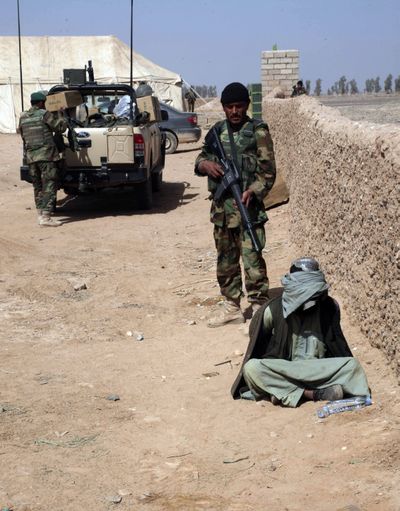Afghan Taliban chiefs arrested
Earlier arrestee gave ‘useful’ info, official says

KABUL – Pakistani authorities, aided by U.S. intelligence, have apprehended more Afghan Taliban chiefs following the capture of the movement’s No. 2 figure – arrests that together represent the biggest blow to the insurgents since the U.S.-led invasion in 2001.
The arrests of more than a dozen Taliban leaders, including known associates of Osama bin Laden, came as militants fought to keep a grip on their southern stronghold of Marjah. Hundreds of militants were holding out against an assault by 15,000 U.S., NATO and Afghan troops.
Nine Taliban militants linked to al-Qaida were nabbed in three raids late Wednesday and early Thursday near the port city of Karachi, Pakistani intelligence officials said, speaking on condition of anonymity.
Two Taliban shadow governors also were apprehended in separate raids, Afghan and Pakistani officials said without giving specifics.
The arrests follow the capture in Karachi of Mullah Abdul Ghani Baradar, second only to the Taliban’s one-eyed leader, Mullah Mohammad Omar. The White House and the Pakistani army have confirmed Baradar’s arrest but have released few details.
Pakistani intelligence officials said Baradar was traveling by car on the outskirts of Karachi when agents intercepted his vehicle, arresting him along with three bodyguards. One intelligence official said Baradar has provided “useful” information that led to the arrests of other militants.
They said communications intercepted by U.S. authorities played a key role in tracking and arresting the suspects, who were in Karachi buying timers and other bomb-making equipment. They were taken to Islamabad for questioning.
Pentagon spokesman Geoff Morrell said the U.S. was pleased with the recent arrests. He declined to say whether they were the result of better intelligence or an increased willingness by Pakistan to go after suspected militants.
Among those arrested were Ameer Muawiya, a bin Laden associate who was in charge of foreign al-Qaida militants in Pakistan’s border areas, and Akhunzada Popalzai, also known as Mohammad Younis, a one-time Taliban shadow governor in Zabul province and former police chief in Kabul, according to Mullah Mamamood, a tribal leader in Ghazni province.
Others captured in Karachi included Hamza, a former Afghan army commander in Helmand province during Taliban rule, and Abu Riyad al Zarqawi, a liaison with Chechen and Tajik militants in Pakistan’s border area, Pakistani officials said.
Taliban shadow governors – Mullah Abdul Salam of Kunduz province and Mullah Mohammad in Baghlan province – were arrested separately in Pakistan about 10 to 12 days ago, according to the Kunduz governor, Mohammad Omar.
The two shadow governors were instrumental in expanding Taliban influence in the north, raising fears the insurgency was spreading beyond its base in the south. Salam was arrested in the Pakistani city of Faisalabad. One of the officials said Salam’s arrest was the result of information gleaned from Mullah Baradar.
Taliban spokesmen have denied the arrests, accusing NATO of spreading propaganda to undermine the morale of Taliban fighters holding out in Marjah against the biggest NATO military operation of the eight-year war.
Two U.S. helicopters dropped elite Marine recon teams behind Taliban lines before dawn today as the U.S.-led force stepped up operations to break resistance on the seventh day of fighting in Marjah.
About two dozen Marines were inserted into an area where skilled Taliban marksmen are known to operate, an officer said, speaking on condition of anonymity because of security concerns.
U.S.-led forces control the main roads and markets in Marjah, a Marine general said Thursday. A British general said he expected it would take another month to secure the town.
NATO said six international service members died Thursday, bringing the number of allied troops killed in the offensive to 11 NATO troops and one Afghan soldier.
No precise figures on Taliban deaths have been released, but senior Marine officers say intelligence reports suggest more than 120 have died.